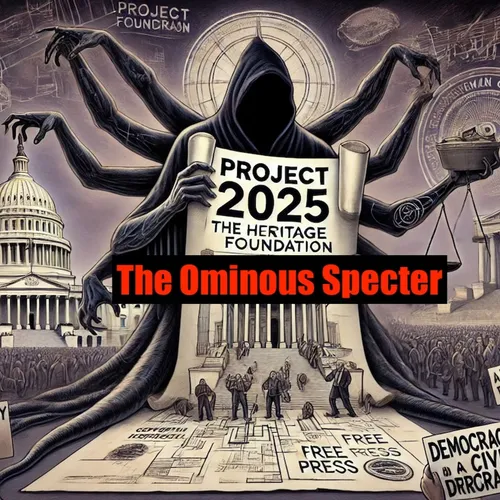Radical Overhaul: Examining Project 2025's Ambitious Plan to Reshape American Governance
- Author
- Quiet.Please
- Published
- Sat 01 Feb 2025
- Episode Link
- https://www.spreaker.com/episode/radical-overhaul-examining-project-2025-s-ambitious-plan-to-reshape-american-governance--64132891
As I delved into the intricacies of Project 2025, a sweeping political initiative crafted by the American conservative think tank The Heritage Foundation, I couldn't help but feel a sense of both fascination and trepidation. This project, unveiled in April 2023, is more than just a set of policy recommendations; it is a comprehensive blueprint for a radical overhaul of the federal government and its agencies, should a conservative president take office.
At its core, Project 2025 envisions a fundamental transformation of American governance, aligning it closely with conservative principles. One of the most striking aspects is its proposal to dismantle or significantly alter several key federal agencies. For instance, the Department of Homeland Security (DHS) would be dismantled, and the Department of Education (ED) would be abolished, with its programs either transferred or terminated. The Department of Justice (DOJ), Federal Bureau of Investigation (FBI), Department of Commerce (DOC), Federal Communications Commission (FCC), and Federal Trade Commission (FTC) would all come under direct partisan control, a move that Heritage Foundation President Kevin Roberts defends as necessary to align these agencies with the president's vision, arguing that "the notion of independent federal agencies or federal employees who don't answer to the president violates the very foundation of our democratic republic"[1].
The project's economic reforms are equally ambitious. It advocates for abolishing the Federal Reserve and replacing it with a commodity-backed currency, such as gold, and shifting from an income tax to a consumption tax. The Tax Cuts and Jobs Act of 2017 would be extended, and individual income taxes would be simplified to two flat tax rates: 15% for incomes up to the Social Security Wage Base and 30% above that. However, this simplification would come at a cost, as most deductions, credits, and exclusions would be eliminated, likely increasing taxes for millions of low- and middle-income households[1].
In the realm of education, Project 2025 seeks to dramatically reduce the federal government's role, promoting school choice and parental rights over federal standards. The Department of Education would be eliminated, and programs under the Individuals with Disabilities' Education Act (IDEA) would be administered by the Department of Health and Human Services. Federal funding for low-income students would expire, and public funds would be redirected as school vouchers, even for private or religious schools. This shift is part of a broader philosophy that views education as a private rather than a public good[1].
The project's stance on climate change and environmental regulations is stark. It proposes eradicating climate change references from all government policies, repealing regulations that curb emissions, and downsizing the Environmental Protection Agency (EPA). The National Oceanic and Atmospheric Administration (NOAA) would be abolished, and states would be prevented from adopting stricter regulations on vehicular emissions. Diana Furchtgott-Roth, the Heritage Foundation's energy and climate director, suggests that the EPA should support the consumption of more natural gas, despite concerns about methane leaks, a potent greenhouse gas[1].
Healthcare is another area where Project 2025 seeks significant changes. It aims to reform the Department of Health and Human Services (DHHS) to promote traditional nuclear family structures. Medicare would be prohibited from negotiating drug prices, and the Medicare Advantage program would be promoted. Federal healthcare providers would be barred from offering gender-affirming care to transgender individuals, and insurance coverage for emergency contraception would be eliminated. Medicaid funding would be cut through various measures, including caps on federal funding and stricter work requirements for beneficiaries[1].
